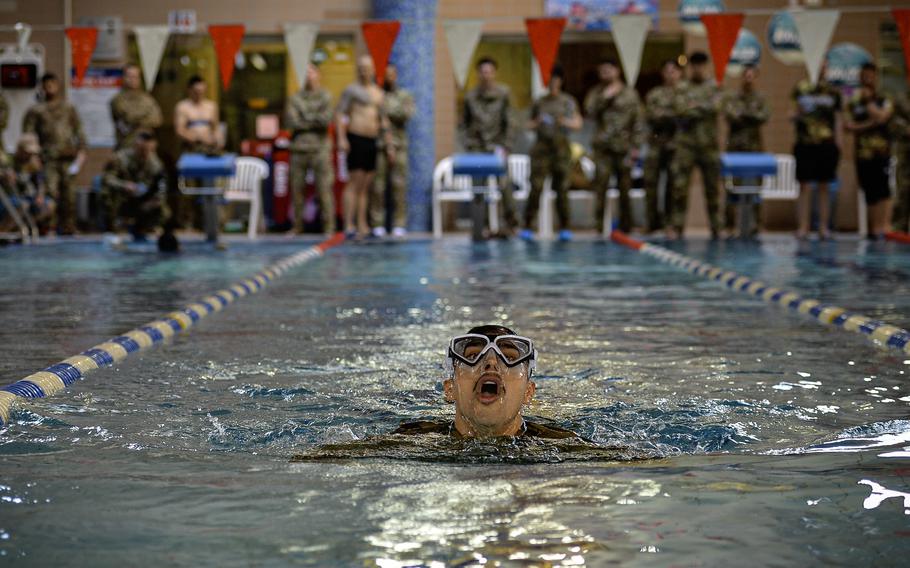
An airman surfaces to catch his breath during the clothed lap swim portion of the German Armed Forces Badge for Military Proficiency at Ramstein Air Base, Germany, April 22, 2024. (Alexander Riedel/Stars and Stripes)
RAMSTEIN AIR BASE, Germany — Tech. Sgt. James Ely grasped for the pool wall just as the timer showed four minutes, his waterlogged uniform making 100 meters feel like a mile.
Without a second to spare, Ely passed the first test for the German Armed Forces Proficiency Badge.
“The whole course is challenging, but this was the part that worried me the most,” said Ely, 41, a paralegal at Ramstein.
The chance to earn and wear the German badge — one of only a few foreign military decorations authorized for U.S. troops — drew more than 300 service members from U.S. bases in the Kaiserslautern area, ready to demonstrate their physical stamina, speed and strength on land and water.
The test began Monday with a splash at the Ramstein Aquatic Center.
Participants had to swim 100 meters in four minutes or less in battle dress uniform, sleeves fastened at the wrist and jackets buttoned to the top to reduce drag.
After the timed swim, participants stripped to their swimsuits, heaving their dripping uniforms onto the deck without touching the wall or pool bottom for support.
The swim is the first event by design, said Senior Master Sgt. Frank Roglmeier, a German airman who helps organize the testing program at Ramstein. Typically, about 20% to 30% of foreign troops fail the swim test, he said, and don’t move on. Being able to swim in uniform demonstrates being ready to “fight everywhere, even in water,” he said.
Eighteen didn’t make the cut this time, Roglmeier said Tuesday.
Senior Airman Sequan Holness, 27, a mechanic with the 86th Vehicle Readiness Squadron, was one of them. He taught himself to swim just last week, he said.
“I sank after I lost momentum,” he said. “This was a very humbling experience.”
Holness said he wanted to earn a medal from Europe before moving back stateside this summer. “This was available, so I thought, ‘Why not?’ ”
Heeding a tip from one of her junior troops in the Space Force, Master Sgt. Anastasia Rash, 35, did the backstroke while moving her arms and legs like a frog to gain speed, she said.
She finished in 3:10, turning in the fastest time among the 53rd Space Operations Squadron, Detachment Charlie.
“I grew up in Ukraine,” she said, “so we have the Black Sea. I love the water.”
Air Force 2nd Lt. Chandler Herren was one of the few swimmers to do the breaststroke the whole way, finishing in 2:13. A former scholastic competitive swimmer, Herren heard about the German military skills badge in college, where his ROTC detachment offered it.
The chance to earn the award while in Germany “gives it a whole different meaning because you want to build that relationship” with German counterparts on base, he said.
Interest in the decoration German military personnel must test for annually has grown to the point where Roglmeier, with help from U.S. personnel on Ramstein, organized a large-scale test this week and called it German American Friendship Days.
Roglmeier used to offer the test to small groups of about 10 or fewer throughout the year, whenever units asked about it.
Last year, however, more than 200 people took the test, and this year, it’s up to 306.
“I think it’s important to build friendships and partnerships … and to be able to do something that’s primarily a German thing,” said Chief Master Sgt. Joshua Wiener, of the 435th Air Ground Operations Wing, shortly after participating in the swim test with about 80 airmen from his wing.
This year’s participants also include service members from countries like Croatia, Slovenia, Italy and France.
Other test components feature target shooting with U.S.-provided ammunition and the German military’s Beretta M9 pistol; a 7.5-mile ruck march with a 33-pound backpack; and a fitness test that includes a shuttle run, hanging with the chin above a bar for at least 5 seconds and a 1,000-meter run in 6:30 or less.
A written test about combat lifesaving skills rounds out the week. An award ceremony is scheduled Friday, with badges awarded in gold, silver and bronze, depending on the participant’s score.
“If you survive all the events, you’ll get a badge,” Roglmeier said.